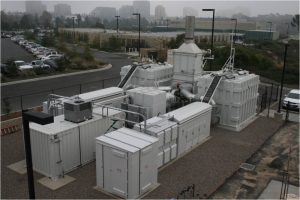FuelCell Energy, Inc. announced last week that it would be installing a 2.8 megawatt (mW) fuel cell in New Haven, Connecticut as its second installation, with the first in Bridgeport.
These two utility-scale fuel cells will provide 5.6 mW of power to United Illuminating as part of its on-site renewable power generation project and will be able to power approximately 5,600 homes. The plants are expected to be up and running in early 2015. The plant will be sited in New Haven’s port area, supplying continuous power to UI’s substation located there.

Clean on-site generation, or distributed generation, is power that is generated close to where it is consumed, eliminating the need to transport power over long distances and generally reducing line losses, transmission and distribution costs, associated pollution that can aggravate diseases like asthma, and the energy sector’s carbon footprint, while simultaneously increasing grid stability and reliability.
Clean distributed generation is one major goal in our state Comprehensive Energy Strategy and reduces greenhouse gas emissions to help meet out state climate goals established in the Global Warming Solutions Act, which requires the state to reduce greenhouse gas emissions at least 10% below 1990 levels by 2020 and at least 80% below 2001 levels by 2050.
We must encourage the development of clean distributed generation by utilities and the private sector to increase grid reliability and reduce greenhouse gas emissions. In an open docket with the Public Utilities Regulatory Authority (“PURA”), some argued for a policy that would discourage private investment in clean on-site generation. Some interested parties argued that building owners wanting to submeter power from clean distributed generation, meaning they sell power generated from an on-site clean power source to their building tenants, should pay transmission and delivery charges back to the power company.
It does not make sense to require on-site clean power generators to pay delivery charges for power that never enters the grid and is, instead, consumed where the power is generated. The purpose of many of our state energy programs is to encourage more renewables and clean distributed generation on the grid. These programs would be weakened if clean distributed generators were required to pay delivery-related charges on power consumed on-site back to the electric company. You can read our comments in that docket here.
Posted by Lauren Savidge, staff attorney at Connecticut Fund for the Environment
